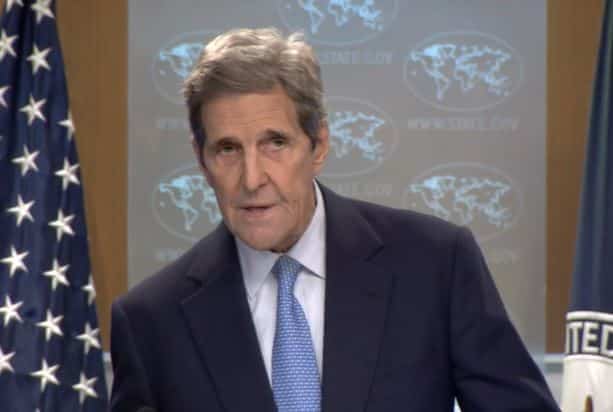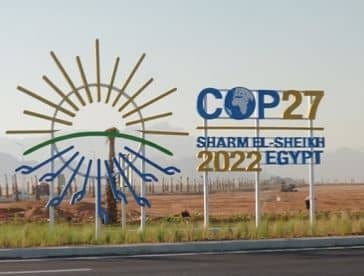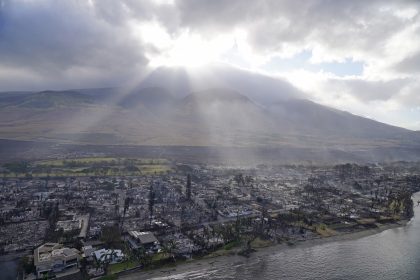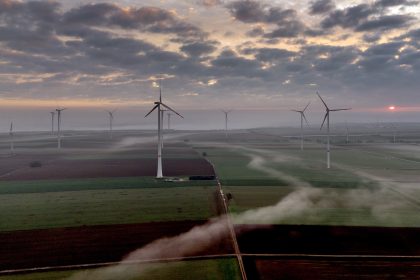Kerry Sees Climate Talks as Time to Ensure Promises Made Are Promises Kept

WASHINGTON — A delegation of 16 high-ranking administration officials will travel to Sharm El-Sheikh, Egypt, next week for COP27, a series of climate talks that U.S. Special Envoy John Kerry is framing as an opportunity to ensure that promises made at past sessions are promises kept.
President Joe Biden will arrive after the midterms, where he will join more than 100 other heads of state, according to the U.N. Climate Office.
More than 35,000 delegates in all are expected to attend this year’s session.
The conference is convened annually by the United Nations to give the world’s leaders an opportunity to negotiate strategies for cutting greenhouse gas emissions and curbing the harshest impacts of climate change.
At last year’s summit in Glasgow, Scotland, the participating countries agreed they must do more and do it faster to prevent a catastrophic rise in global temperatures, but progress has been stymied by a number of factors including rising inflation, an energy crisis in Europe, and the ongoing, unprovoked war in Ukraine.
The result has been prolonged droughts in parts of the U.S., a spreading famine in Africa, devastating floods in Pakistan that have killed more than 1,700 since June, and persistent heat waves across Europe that saw a peak temperature of 116.6° F recorded at Pinhão, Portugal, in mid-July.
These conditions have only heightened tensions among rich polluting countries and poorer nations bearing the brunt of the worsening climate impacts, particularly over the question of who should pay the costs of mitigating climate change.
Already, Swedish environmental activist Greta Thunberg has said she will not attend the two-week long meeting, accusing COP organizers and its wealthier participants of merely trying to greenwash the planet-harming activities.
Addressing reporters at a State Department briefing on Wednesday, Kerry said the U.S. sees the meeting at Sharm el-Sheikh as a “stepping stone” and an” opportunity for all of us to get together and be able to measure where we are today, where we aren’t, and what we need to do get on track.”
“We view COP 27 as an implementation of COP,” the special presidential envoy for Climate said.
COP stands for “Conference of the Parties,” the parties being the 197 nations that originally agreed to the United Nations Framework Convention on Climate Change in 1992.
Under the terms of that treaty, the participating nations agreed to address “dangerous human interference with the climate system” and to reduce the amount of greenhouse gas emissions released into the atmosphere.
In addition to making sure “the promises made in Glasgow are actually being pursued at the pace that they need to be pursued,” Kerry said the upcoming talks will also give “folks who didn’t step up in Glasgow … a chance to step up and provide … new indicators of what they are prepared to do.”
Kerry went on to emphasize that the new commitments are critical.
“Why? Because the scientists, the Intergovernmental Panel on Climate Change, and all of the evidence are telling us that it is imperative we do everything in our power to keep the Earth’s temperature increase to 1.5 degrees C,” he said.
“If we don’t do that, we will bring much greater destruction on ourselves and on the planet, and make it much more inhospitable — even unlivable in some places,” he continued, adding, “There are so many consequences to not getting this job done that to some degree it’s overwhelming to some people … and they back off and think they can’t do anything.”
As with any massive undertaking, the devil is in the details and as a result, the ultimate goal for this year’s conference remains in dispute, even as delegates have begun to pack their bags and plan their travel.
The world’s wealthier countries want to focus on transitioning developing countries off of fossil fuels and onto a reliance on energy from renewable sources such as solar, wind, waves and underground pockets of extreme heat.

Poorer countries and low-lying states that are particularly vulnerable to sea level rise want to see a new fund created through which richer, more industrialized nations would bear the cost of infrastructure improvements and even economic growth lost to worsening climate conditions.
The question of so-called “loss and damage” funding for developing nations has been contentious for years, in part because the richer nations fear being held legally liable for the surging cost of damages caused by climate change.
On Wednesday, Kerry said the U.S. is “anxious” to see the loss and damage issue “dealt with upfront and in a real way at COP.”
“We anticipate that it will be an agenda item, and we’re perfectly comfortable helping it to be that, which means at some point you’ve got to have an outcome,” he said.
The secretary noted that the Glasgow session ended with an agreement to resolve the issue over a two-year period.
“Maybe it could be done faster; we’ve not sure,” he said.
“But I think we have to get there and have the conversation. And we certainly support coming out with some kind of structure that provides for appropriate financial arrangements … and we will work in good faith to do that.”
Of course, disputes are part and parcel of the climate negotiations.
It took two years from the first COP, held in Berlin in 1995, for the participating nations to agree to what at the time was hailed as the “landmark” Kyoto Protocol.
The protocol required only that wealthy, industrialized nations curb their emissions while developing countries — a group, it should be noted, that included such significant economic players as China, India and Brazil — would do so voluntarily.
But the Kyoto Protocol proved too much for the United States Senate, which joined President George W. Bush in opposing it.
It wasn’t until 2015, during the Obama administration, that the impasse was finally broken, and a new agreement was brokered.
The Paris Climate Accord set a new long term goal of keeping the mean rise in global temperature below 2 °C (3.6 °F) above pre-industrial levels, and preferably limit the increase to 1.5 °C (2.7 °F).
The accord also stated that global greenhouse gas emissions should be cut by roughly 50% by 2030, and that each participating country must determine and regularly report on its contributions to that reduction.
The accord did not force individual countries to set specific emissions targets, but each target set was expected to go beyond the one it replaces.
While the agreement was lauded by the leaders of the participating countries, environmentalists criticized it as being insufficiently binding.
Still, the looseness of the agreement wasn’t enough to satisfy former President Donald Trump who withdrew the United States from the Accord shortly after his election. Biden has since rejoined the agreement.
When it comes to COP 27, Kerry said the U.S. has four “very specific priorities.”
“Number one: We seek a collective message out of the COP that the world is going to remain strong on climate ambition and will build on, not go backwards, from the pledges that were made in Glasgow,” he said.
“As we know, according to the International Energy Agency, if all the promises of Glasgow are indeed fulfilled, we would by 2050 be at about 1.8 degrees C of warming,” he said. “The fact that the pledges to date with only 65% of GDP can achieve that is really quite remarkable, and it says to all of us, if we do what we pledge to do … we can actually win this battle.
“The second thing we’re working to do is to get closer to that 1.5 degree C. Sixty-five percent is not enough; we need more people, more countries participating,” Kerry said.
“Third, we are pursuing various multilateral initiatives that will contribute to accelerating the reduction of emissions, and also facilitating the long term transition,” he continued. “We are speeding ahead with the implementation of the Global Methane Pledge that you know we debuted in Glasgow. One hundred twenty-two nations have now signed up. It’s a 30% reduction in methane emissions by 2030, the next seven years.
“If that happens, it is the equivalent of every car, every truck, every ship and every airplane in the world all going to zero by 2030. It’s an enormous gain, and we have massive participation in this effort by countries around the world.
“Fourth and last, we are showcasing a host of U.S. government deliverables related to mitigation and adaptation. We’re working very hard to promote adaptation and resilience to climate impacts that are already being felt globally,” he said.
As for Greta Thunberg, Kerry said he had “great respect” for the climate activist.
“I’ve met with her and I like her and hugely appreciate the passion she has brought to this cause and the many, many people she has motivated to be engaged and involved,” he said.
Kerry went on to say everybody has a right to make their own decision about what they want to attend or “where they think something important may or may not be happening.”
“While many of us are chagrined that it has taken so long for us to get to a place where more and more people are accepting what’s happening, we are there,” he continued. “And the only way to be able to organize ourselves and get the job done, when you have 200 or so nations that are involved in this, is to come together somewhere and work at it.
“Now, she’s not a government official and therefore doesn’t have the same role to play in that regard. But I completely respect her choice and, most importantly, am grateful that somebody has cared as much as she has cared and has put herself on the line as forcefully as she has,” Kerry said.
The U.S. delegation to COP 27 in Sharm El-Sheikh, Egypt, will be led by U.S. Special Envoy for Climate John Kerry.
Other senior U.S. officials include Alice Albright, CEO, Millennium Challenge Corporation; Antony Blinken, secretary of State; Brian Deese, director, National Economic Council; Enoh Ebong, director, U.S. Trade and Development Agency; Jennifer Granholm, secretary of Energy; Reta Jo Lewis, president & chair, Export-Import Bank of the United States; Brenda Mallory, chair, Council on Environmental Quality; Scott Nathan, CEO, U.S. International Development Finance Corporation; John Podesta, senior advisor to the president for Clean Energy Innovation and Implementation; Samantha Power, administrator, U.S. Agency for International Development; Michael Regan, administrator, U.S. Environmental Protection Agency; Rick Spinrad, administrator, National Oceanic and Atmospheric Administration; Jake Sullivan, National Security advisor; Tom Vilsack, secretary of Agriculture; and Ali Zaidi, White House National Climate advisor.
Dan can be reached at [email protected] and at https://twitter.com/DanMcCue.

























